Jun
30
PTSD Series Discussion #5
Filed Under Brain Injury, Combat PTSD, PTSD, PTSD treatment, TBI & PTSD, Tears of a Warrior, Treating PTSD, War | Comments Off on PTSD Series Discussion #5
By Janet J. Seahorn
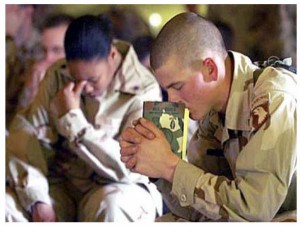
When is it time to seek outside help?
This is pretty easy to answer: You will know if it is time to seek outside help when the behavior of the serviceperson becomes abnormally un-normal. When life becomes a teeter-totter of ups and downs that can’t seem to be controlled no matter how hard you try. When your surroundings and relationships seem unstable and unsafe and you aren’t sure why, get help.
When my husband began experiencing PTSD, neither one of us had a clue what was going on at the time. There was no such thing as Post-Traumatic Stress. War was something that a person went to, came home from and tried to move on. It wasn’t discussed. It wasn’t thought about (or so we once thought and wanted to believe).
No one considered how the events of combat could impact an individual for the rest of his life. If you came home somewhat physically whole, that was a gift. You healed physically, and you lived as if all the horror from battle never happened. The past was the past and it should not impact one’s future. What an absurd assumption.
Now we understand that nothing in our past is ever fully in the past. The good and the difficult follow us wherever we go. We are part of our experiences. With understanding, courage, and information we may gain strength and wisdom to move forward. Getting outside help can guide us in forming the wisdom and understanding needed for healing.
What are some good resources for help with PTSD or TBI?
There are many resources available to our military service men and women. Check with your local Veteran’s Administration Center if you suspect you need support. You may need to be referred to a Veteran Hospital for further testing and diagnosis, especially if you suspect a traumatic brain injury. Every state has several local centers that have been established to help veterans find the appropriate placement and support needed to get the services they may require. (VA Centers are listed in our book)
Don’t stop at NO if you are convinced you have something wrong that necessitates some form of treatment. Sometimes all you need is that one special person who can take your situation seriously enough to get help. Our family personally saw this happen with my brother. He was extremely wary of anyone associated with the government. As a Vietnam vet, his mistrust of a broken, ineffective system made him reluctant to seek help from a military or veteran organization of any kind. Once he decided to seek services he ran into several brick walls. Yet, he kept trying, until he finally found a former army sergeant who took his situation seriously and made things happen.
It only took one person to make a difference. Don’t’ give up or give in to frustration. Keep going. Help is available, but sometimes you may have to fight for it just like you did in battle. If you did it then, you can do it now.
In ending, we want to thank you and your loved ones for your service and sacrifice. You have made a difference that few will understand, or perhaps fully appreciate. Nevertheless, please recognize the depth of your courage, strength and warrior spirit. These are the attributes that sustained you through combat, and now they will do so again in moving you towards healing and a better life.
Jun
24
Healing Waters & Wounded Warriors
Filed Under Healing Waters, Tears of a Warrior, Trauma, Treating PTSD, War | 1 Comment
 by Janet J. Seahorn
by Janet J. Seahorn
How do we mend a wounded body or soul? How do we take a step forward in healing a spirit that has been battered by the trauma of battle? One possibility is to introduce the wounded warrior to a place of cooling waters, a place where fish are abundant and one can float through the waters which hum a soothing lullaby of serenity. Project Healing Waters is a volunteer organization that is dedicated to supporting the mending process of military personnel and veterans who have been impacted by the effects of combat. And it uses waters and fly fishing to achieve its mission.
The idea originated when its founder, Ed Nicholson, a veteran of previous war, was himself being treated at Walter Reed Medical Center in Washington D.C. when he noticed a number of young warriors sitting idly in the waiting room. Ed decided to invite several to go fishing with him. On that first excursion, he discovered how this simple fishing experience made a huge difference both physically and emotionally with the young vets. Where eyes were once vacant, there was now a light of excitement; where physical energy was almost stagnate, a resurgence of vigor returned; and where a life seemed consumed by pain and hopelessness, Mother Nature breathed her message of rebirth and Trust into the mind, heart, body, and soul of the wounded warrior.
Ironically, the Healing Waters Foundation has found that the greatest challenge is getting Wounded Warriors to the program. Recruitment is a huge obstacle, partly because of the physical and emotional needs of the individuals, and partly because of the legal ramifications of the vet centers/hospital treating the individuals. Gosh, I never imagined the number of logistical barriers faced by organizations wanting to help make a difference.
Project Healing Waters tries to work through a VA therapist to identify prospective participants. By having a solid system in place, both the support organization and the VA centers can offer a clearer, more holistic approach to healing. The intervention received by the vet can then be measured and assessed as to what works best and why. This knowledge can then be shared with other VA centers and hospitals across the United States.
Ancient cultures have long understood that wounds of the body and soul need a holistic approach for healing to occur. Medications, cognitive therapies, surgeries simply aren’t enough. Where medications have some difficult side effects, nature offers only blessings. Where daily life often brings disorder, there is an order in nature – a way in which all things seem divinely connected from a single rain drop to a flowering mountain meadow. Where days feel misaligned, nature realigns the soul and spirit, letting us knows that all is as it should be. And where our day- by-day activities may seem bounded by the constraints of “to do lists”, nature chants a song of freedom, encouraging us to spread our wings and soar – even if these wings feel shattered.
So, if you are a disabled vet, knock down the door of your local VA center or hospital and request that your medical personnel get you aligned with a volunteer from Healing Waters. This can also be a breathtaking opportunity for you and your family.
Healing Waters volunteers serve as mentors and companions to our country’s wounded warriors. Their mission is uncomplicated – it is merely about healing and mending minds, bodies, and spirits – one unhurried cast at a time – one soothing river somewhere in America. Casting, Healing. Casting, Healing. Casting, Healing, and the wounds begin to slowly mend.
HEALING WATERS
My soul was battered by combat’s horrors,
So I went to the water to heal.
Wounds covered by flesh with war torn scars,
I went to the water to heal.
My heart was broken unable to feel,
I went to the water to heal.
And the water murmured softly–
Be at peace my precious son
Your soul is safe,
Your battles are done.
My waters shall cool and soothe your weary heart,
You came to me
Your healing can now start.
Not knowing where to turn for comfort or for calm,
I went to the water to heal.
The deafening clatter of ghosts from the past,
I went to the water to heal.
The strain of the city made my sanity reel,
I went to the water to heal.
And the water murmured softly
Sit beside me and be still,
Listen to my tranquil song
Let your soul be filled.
My waters shall comfort your torn and tattered soul.
You came to me
I will purge you of your foes.
For sacred, healing waters
are not new to any man,
They’ve been around a long time
Lapping shores of golden sand.
Silently restoring with their tender, gentle hands
A Life to kinder being
Healing water shall command.
by Janet J. Seahorn
Jun
24
PTSD Series Discussion #4
Filed Under Combat PTSD, Events, Family, PTSD, Tears of a Warrior, War | Comments Off on PTSD Series Discussion #4
by Janet J. Seahorn

How can we talk about PTSD as a family?
Gosh, this is a tricky question with an even trickier answer. As we have discussed in most of the prior questions, the first step is to acknowledge that upon returning from combat things aren’t quite normal. Become informed about the signs and symptoms of PTSD. Be honest as much as you can about what each of you is feeling. As the service person, you don’t have to go into all of the horrible details of your experiences, but you do and will need to discuss the truth that your military life in a combat zone may have been pretty distressing; that what you saw and did was often unsettling.
As the significant other or spouse, your role initially is to just listen. Try not to ask too many questions. Sometimes it may seem you are prying. Try and wait a bit before going into the details. But it is crucial, as a family, to talk. Silence is simply not an option. It creates distance by making assumptions about behaviors that may not be accurate.
In our book, we describe an incident where a young man who had been in several roadside bombings returned home from Iraq. On a quiet Saturday afternoon, the family decided to take a trip out of town to a favorite shopping center. It was to be a fun outing of togetherness. Things were going well until the young family came to bridge where a man waving for help was standing by the roadside next to a car with a flat tire. The wife suggested they stop and help, however, the young serviceperson immediately turned his vehicle around in the middle of the road, angrily stomped on the gas and headed home. Not knowing what was happening, the wife assumed her husband was acting unreasonably. It was a silent ride back to town. The young vet never told his wife what was going on in his mind. Later, during his scheduled visit to his VA counselor he retold the story. He knew his wife and children were upset with him for ruining their fun afternoon. However, what he saw was not an ordinary man with a flat tire needing help. What his mind and body saw and felt was a possible setup for an IED (Improvised Explosive Device). He had seen this many times during his tour of duty in Iraq. He had two thoughts to keep his family out of harms way: 1) He could shoot the “terrorist” standing on the roadside, or 2) He could, without delay, get his family away from the danger zone. Understanding that shooting the “threat” was probably not the best decision, he chose option two. Makes perfect sense, but without talking he went home angry and upset. And his family had no clue as to what had just occurred.
In our book we advise “If you care, you share”. Sharing creates understanding. Understanding generates compassion. And compassion establishes hope and protects the relationship.
Another word of advice about discussing a concern: Never try and sit down to talk over an issue when one or both parties are in a full pitch of rage or anger. You can’t stop a charging bear… it is already on a mission to attack. You must wait until tempers are calmer and conditions settle down enough to have a reasonably calm and “adult” discussion. If a blaming game begins, stop immediately. Blaming never solves the problem; it only throws more fuel on a hot fire. Use “I” statements such as, “I start to feel afraid when I see you getting angry and I don’t understand why?” or “It is hard for me to go to family events without you. I miss doing things together and want to know what I can do to make it OK for you to attend some of our family get-togethers.”
Most of our family conversations, once we began to understand what we were facing, resulted in a compromise that everyone could agree would make the situation better for all involved. We now try not to live on assumptions by doing a reality check with the person. For family events, every person becomes responsible for him or herself. Sometimes my husband chooses downtime away from a houseful of noisy people. He goes to a quiet room to watch TV or read a book while the rest of us play a rowdy game of Pictionary or Shout It Out. This is a Win/Win for everyone and is absolutely acceptable behavior.
Jun
3
Memorial Day in Evanston, WY
Filed Under American Patriotism, Events, Family, Memorial Day, Tears of a Warrior, War | 1 Comment
by Janet J. Seahorn
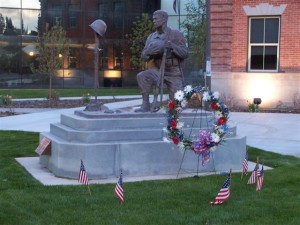
You hear stories about the patriotism of small town USA. The way the community comes together as a single entity to honor its military – those individuals who have served our country. The events always include a bit of flag waving and back patting, “Thank you for your service”. This Memorial Day we had the honor to experience one such town. This is a town, Evanston, Wyoming, which far exceeded any story or past city we have visited.
It was early Sunday evening when we arrived in Evanston. Tony was asked to be the guest speaker at their annual Memorial Day event. We had just returned the day before from Europe. Both of us were more than a bit jet lagged, and I was secretly wishing I was sleeping in my comfy bed back home and wondering what the heck we were thinking when we first accepted the speaking engagement.

As we drove through the streets around town, we noticed flags flying from bridges, street corners, store shops, and of course homes. More flags than we have ever seen. The cemetery was filled with flags and brightly colored flower arrangements. A motorcycle bike rally made the atmosphere even more charged.
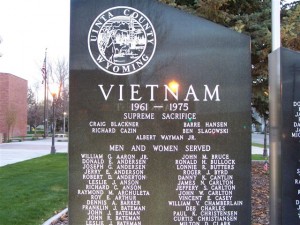
Then we passed a truly humbling sight, the town’s monuments set right in the center of the Court House and Civic Center. Monuments that went way back to the Civil War. The most interesting two tributes were to the Korean and Vietnam conflicts. These were modeled after the Vietnam Wall in Washington D.C. What made them unique, however, was the black granite slabs held the names of every resident of the county who served in the war zone, not just the names of those who had died. The words carved into one stature said it well, “All gave some; some gave all”. Wow! We have never seen a town where every military person was acknowledged. You could trace the heritage of the community’s military generations from WW I forward. Many families had at least four or more last names engraved on each monument. So much sacrifice for a household to bear.
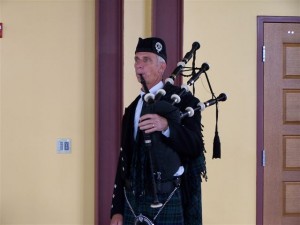
As we listened to the Memorial Day speeches, watched the presentation of flags honoring all military branches, including a flag for the POWs and the MIAs, heard the hallowed sounds of the bagpiper bellowing Amazing Grace, and viewed the solemn and appreciative faces of the people, it was a “lump in the throat” experience. Yes siree, Evanston, Wyoming is truly one of America’s most patriotic towns. It was obvious that such gratitude is a daily way of life, not merely a one day event. They live the words, God Bless America, and God Bless those who serve her mission of freedom and liberty for all.
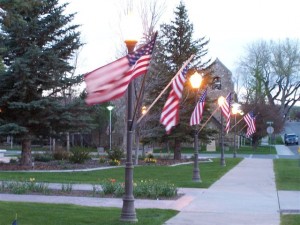
Thank you for sharing your patriotic spirit with us and showing the world that honor, integrity, and flag waving are not political statements, but a way to demonstrate respect for the sacrifice given by the few, so that the many can live in a land of abundance and independence.

